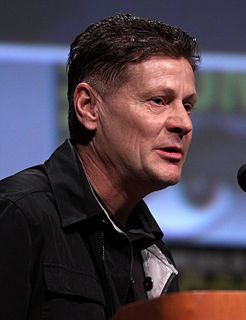A Quote by Randy Alcorn
Fiction has subversive potential. People let it into their minds, like the Trojan Horse. They don't know what's inside. You hook them with the story, and God can work below the level of their consciousness. Fiction can be propaganda for evil or convey a theme that impacts people for good.
Related Quotes
Science fiction is a weird category, because it's the only area of fiction I can think of where the story is not of primary importance. Science fiction tends to be more about the science, or the invention of the fantasy world, or the political allegory. When I left science fiction, I said "They're more interested in planets, and I'm interested in people."
With Rodham, for instance, it has to work on an emotional level. It has to work on a character level. If it's only "Look, it has famous people," then it's a wax museum come to life and that's really boring. It's sort of like what they say about science fiction and horror where the really good ones, if you remove that element of it, it still has to work. That's the reason The Shining works or Rosemary's Baby or Blade Runner.
I'd be surprised if non-fiction writers hate to be interviewed. We all hate them, because there's really nothing to say except "Read the book." Right? At least with non-fiction, you can kind of convey some information, and people can decide for themselves whether they want more of that kind of information. But with a novel, what am I going to do?
With fiction, you are creating an imaginary world. And it can be a very mechanical process. In a fictional film, you create the characters who become "real people" when facing the camera. When you stop shooting, they change their costumes and become someone else. And people tend to believe in documentary more than fiction. Even if the fiction is based on a true story, everybody will say, "Oh, they're only actors."
You have to get inside the people you are writing about. You have to go below the surface. And that's to a very large degree what all writers are doing - they're trying to get below the surface. Whether it's in fiction or poetry or writing history and biography. Some people make that possible because they write wonderful letters and diaries. And you have to sort of go where the material is.
My first obligation is to entertain but as far as science fiction goes, it's much easier to comment on today from another time because people then aren't focused on 'did you get the details right?' It's sort of a Trojan horse approach to ideas because it's wrapped in the future, it's wrapped in action, thriller.
I would say that most of my books are contemporary realistic fiction... a couple, maybe three, fall into the 'historic fiction' category. Science fiction is not a favorite genre of mine, though I have greatly enjoyed some of the work of Ursula LeGuin. I haven't read much science fiction so I don't know other sci-fi authors.


































